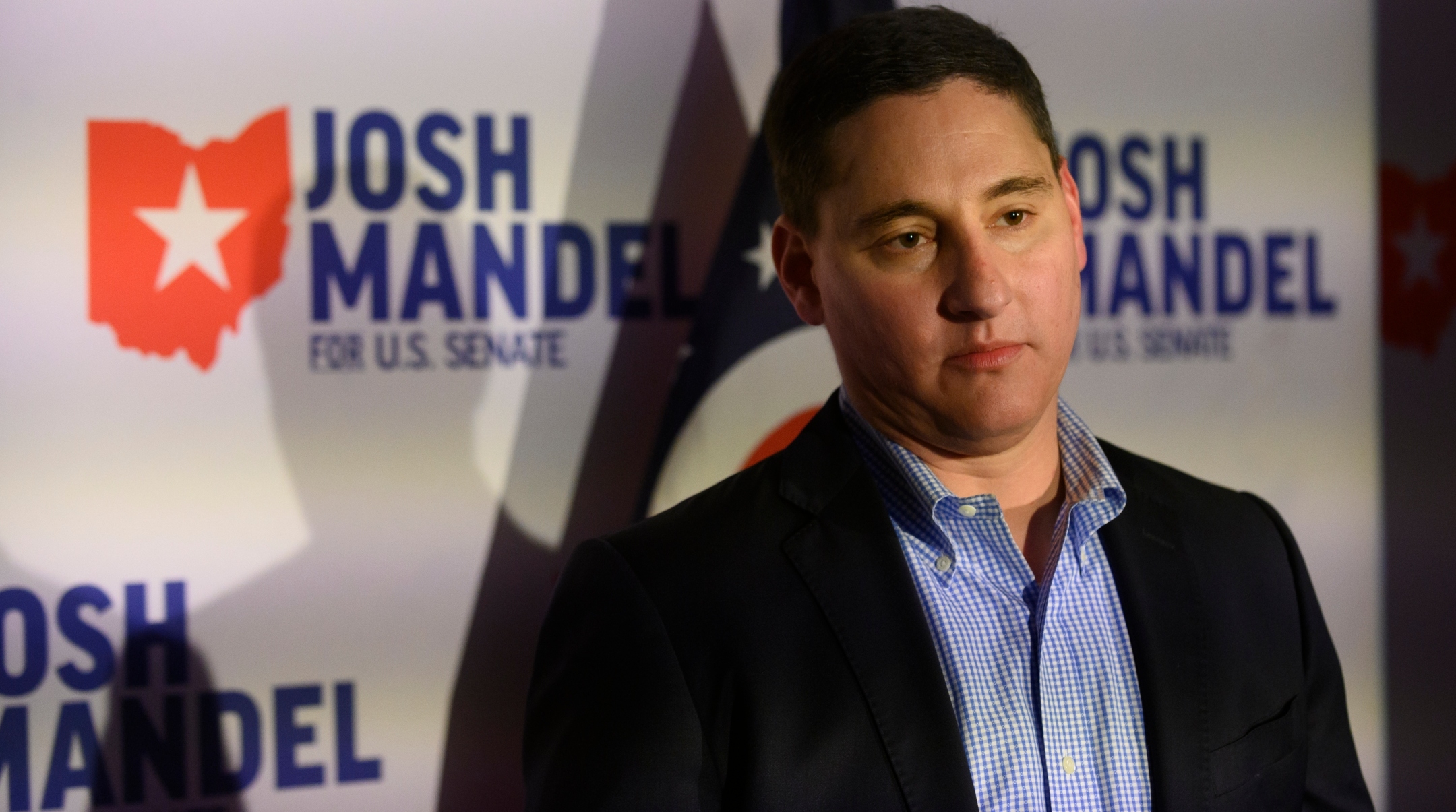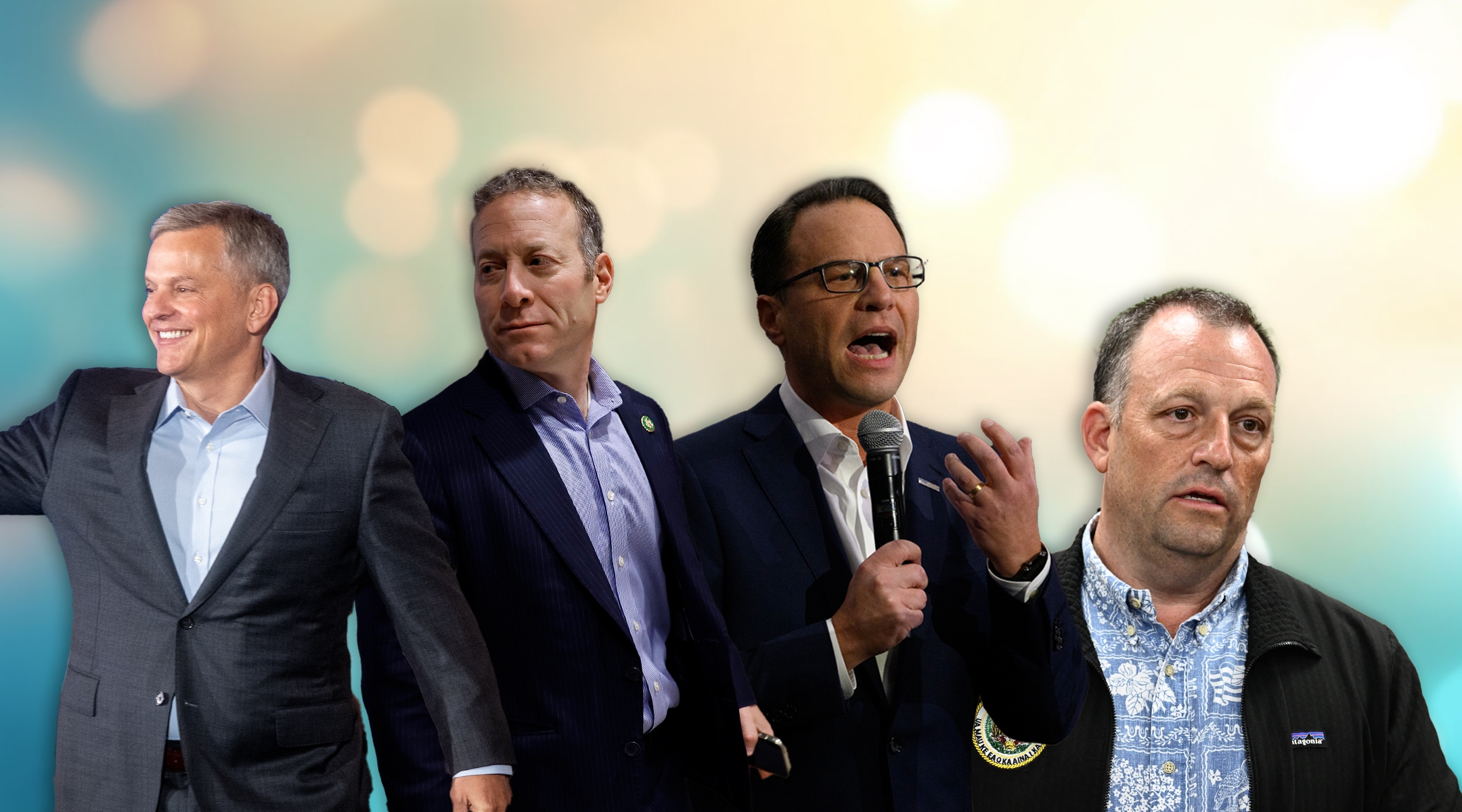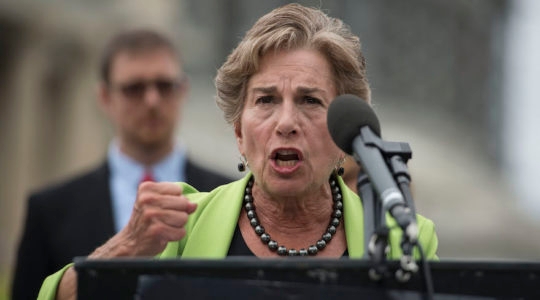The 2024 election was a dismal one for most Democrats. But it has been a very good year for one particular demographic: Jewish candidates named Josh.
In North Carolina, Josh Stein won his gubernatorial election over (reportedly) self-proclaimed “Black Nazi” Mark Robinson. When Stein assumes his new role in January, he will be the third Jewish Josh heading a state — after Pennsylvania’s Josh Shapiro, a popular official thought to have lofty ambitions, and Hawaii’s Josh Green.
A fourth may soon join them. Perhaps sensing the backwinds propelling Joshes everywhere, U.S. Rep. Josh Gottheimer last week announced his candidacy for governor of New Jersey. If he wins his race next year, fully 8% of all governor’s mansions in the country would be occupied by Democratic Jewish Joshes. (Of note: The “J” of J.B. Pritzker, Illinois’ Jewish Democratic governor, stands for “Jay.”)
Just a few short years ago, the national community of Joshes had devolved into battling with pool noodles (really) over rights to the name. Now, the Renaissance of Josh in America’s halls of power raises some serious questions: Is it just a coincidence? Or does it perhaps speak to a broader, subconscious trend among an electorate that finds itself craving strong Jewish leaders?
“I think it’s a coincidence,” Sarah Benor, a linguistics professor at Hebrew Union College and director of the Jewish Language Project, told the Jewish Telegraphic Agency.
But, Benor added, “I think the reason it’s a coincidence is because of the popularity of that name and the generation that our politicians are from.”
She’s not just joshing. All four Joshes sitting in or seeking the governorship were born between 1966 (Stein) and 1975 (Gottheimer). Those years overlap with the period when, according to the records of the Social Security Administration, the name Josh began its meteoric rise in popularity. It hit No. 24 among boys in the 1970s, climbed to No. 4 in the 1980s and 1990s and peaked at No. 3 in the 2000s.
Benor says that trend appeared among Jews first. Whereas early immigrant Jews tended to name their children in a way that would not explicitly call attention to their Jewishness, the next generation of Jews reacted to assimilation in part by choosing more Biblical names, while also joining what Benor describes as a 1960s-era “trend toward ethnic pride and multiculturalism.” The trend later spilled over into the general population.
“Jews were becoming more entrenched in American society, farther removed from the generation of immigration, and they felt more comfortable expressing their distinctiveness in their names,” she said.
And while the name “Josh” might not immediately register as Jewish to the general population, it certainly does to other Jews.
“In the Jewish imaginary, it’s coded Jewish,” she said. “Those are also very popular names beyond the Jewish community. But if you’re in the Jewish community, you don’t necessarily know that. And all the Joshes you know are Jewish.”
But is there something about the name Josh that invites the image of a strong authority figure? After all, the original Josh was Yehoshua Bin Nun, the protege of Moses who becomes a leader of the Jewish people at the end of the Book of Deuteronomy. Subsequently, in the Book of Joshua, he is the man who leads the Israelites into Canaan.
“The Biblical namesake of all these Joshuas was a major leader of the Jewish people,” Benor said. “Just something to look at.”
Could the Joshmentum (to borrow a portmanteau coined by another J-named Jewish politician) keep rolling? A Jewish Telegraphic Agency survey of the Jewish Joshes currently serving in government, or who have expressed an interest in politics, turned up some other possible future gubernatorial Joshes.
Reached for comment, a spokesperson for California Democratic State Senator Josh Becker, who represents part of the Bay Area, did not explicitly rule out a gubernatorial run in his future.
“Senator Becker is deeply humbled to have been reelected to serve the constituents of Senate District 13 and looks forward to continue his service for this upcoming term,” the spokesperson said.
“While I cannot speak to Senator Becker’s thoughts on ‘Jewish Joshes in politics’ I can say that he is an active and proud member and Vice Chair of the Jewish Caucus, where he works to instill Jewish values in policy and uplift all communities,” the spokesperson added. “I would hope and suspect that these are goals that many of our Jewish elected officials share and pursue with passion.”
Other Jewish Joshes were not so forthcoming.
Neither fellow California State Sen. Josh Newman; nor Rhode Island State Sen. Joshua Miller, both Democrats; nor Josh Levy, the (nonpartisan) mayor of Hollywood, Florida, returned requests for comment asking if they, too, were planning to follow the lead of their fellow Joshes and run for governor.
Neither did a representative for Josh Kraft, son of New England Patriots owner Robert Kraft, who himself (Josh, that is) has teased a possible run for mayor of Boston next year. He currently runs the family’s philanthropic initiatives.
In the past, Josh Kraft’s name was floated as a candidate for governor of Massachusetts, seemingly making him the next-most-likely Josh to chase the statehouse dream.

Republican U.S. Senate candidate Josh Mandel concedes defeat at an election night gathering in the state primary, Beachwood, Ohio, May 3, 2022. (Jeff Swensen/Getty Images)
Some Joshes — including Shapiro and Stein — won their posts in states that went red for president, but Josh fever hasn’t quite spread across the aisle. In 2022, Josh Mandel, the Jewish former state treasurer of Ohio, mounted a campaign for the U.S. Senate (the second time he ran for the spot) after making an explicit appeal to “Judeo-Christian” right-wing voters. He lost the Republican primary to a political neophyte named J.D. Vance.
Today Vance (who is not Jewish, and whose “J” does not stand for “Josh”) is vice president-elect. Mandel’s name is not being circulated among possible replacements for the seat.
Mandel — who last year joined the board of TruthTells, a right-wing organization that purports to “name and shame Jewish politicians and policymakers who don’t stand up to antisemites” — did not respond to a request for comment on his political future.
A request for comment to Josh Cohen, former Democratic mayor of Annapolis, Maryland, also was not returned.
Cohen got a head start on his fellow Joshes: He was first elected to public office in 2001, at the age of 28, and ascended to the mayoralty five years later. But the luck of the Joshes ran out in his bid for reelection, and in 2012, Cohen lost his mayorship by 59 votes.
He hasn’t returned to public office in more than a decade, instead pivoting to a career in electric vehicle policymaking. But he doesn’t seem to mind. He recently told Maryland Matters that his opponent at the time “did me a huge favor by beating me.” And he has no apparent desire to re-enter the political realm.
Still, if the Josh of the Bible could orchestrate a mass circumcision of every Jewish male before passing into the promised land (per Joshua 5:3), the possibilities are limitless. A rising tide lifts all Joshes.
JTA has documented Jewish history in real-time for over a century. Keep our journalism strong by joining us in supporting independent, award-winning reporting.






